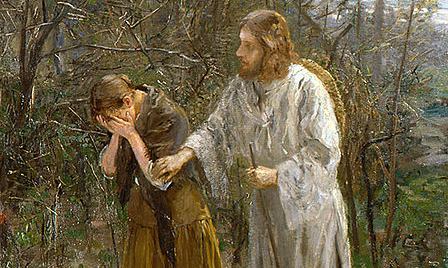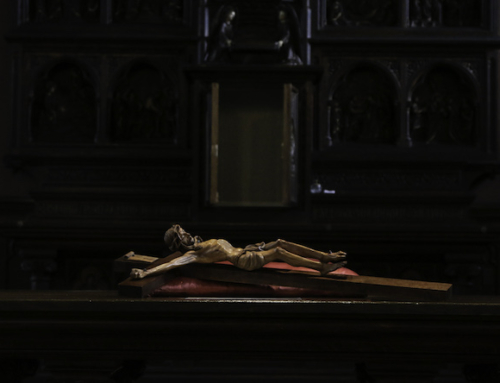In the readings from today’s Mass, we hear an oracle from one of the most trying times in the history of Judah, the events surrounding the Babylonian exile. During this period, Jerusalem was conquered and many of its inhabitants were deported far away to the Babylonian empire in an attempt to destroy the nation of Judah.
Jeremiah leaves us the Lord’s words: “This is what I commanded my people: Listen to my voice; then I will be your God and you shall be my people….But they obeyed not, nor did they pay heed….This is the nation that does not listen to the voice of the LORD, its God, or take correction. Faithfulness has disappeared; the word itself is banished from their speech” (Jer 7:23-24, 28). A little after, although it is not in the reading for today, Jeremiah speaks of the result of all this: “I will make to cease from the cities of Judah and from the streets of Jerusalem the voice of mirth and the voice of gladness, the voice of the bridegroom and the voice of the bride; for the land shall become a waste” (Jer 7:34). Jeremiah prophesies destruction for his homeland. Great sin is followed by great punishment.
Saint Catherine of Siena in her Dialogue writes about tears. She describes the different ways that God uses our sadness to bring us into ever closer union with him. We are sad when we encounter the emptiness of sin and the fear of eternal punishment. These turn us away from sin and toward virtue. Those who begin to turn away from sin, however, still lose the things they love, from worldly goods to beloved friends. Those who have grown accustomed to feeling close to God may even feel, for a time, a loss of spiritual consolation, as if God were withdrawing from them. These losses also lead to sadness, although of a very different quality and for different reasons. This helps to purify love of its selfishness, so that the soul may turn more and more to God. Even sadness due to evils committed against God and the people that we love can bring us closer to God, because we can unite our suffering with the suffering of Jesus on the cross. God uses our sadness to lead us to him.
In the case of Judah at the exile, the sadness was a result of just punishment for sins. This sadness was made all the more painful because it was wrought by God through an iniquitous nation, Babylon. The prophets like Jeremiah, however, understood that God was permitting these terrible evils to occur in order to bring about far greater goods. Although God is supremely just, his justice is part of the way he communicates his goodness. In the case of rebellious Judah, the Babylonian exile was exactly what was necessary to bring a wandering people back to the true faith, and to prepare them to receive the Incarnate Lord hundreds of years later. From another point of view, this is God’s mercy. Instead of abandoning his faithless nation to eternal perdition due to their own sins, he brought it back, though the cost was great.
Catholics have traditionally undertaken voluntary mortifications during Lent, such as giving up TV or dedicating extra time to prayer in the midst of a busy schedule. But we should also take time this Lent to meditate on the ways that God is mortifying us. That mortification may be through loss of the things or the people we love, through frustration caused by those around us, by injustice, or by anything that causes suffering in our lives. It is not simply that God is vindictive and must punish us for our sins in order to satisfy his wrath; rather, by allowing suffering in our lives, he is leading us ever closer to him. The cost may be great and we may have to give up what we thought we loved, but when we suffer, rather than allowing ourselves to be consumed by our anger, sadness, or frustration, we can turn to God, offer our pain to him, and ask him where he is leading us.
✠
Image: Fritz von Uhde, Woman, Why Weepest Thou?







